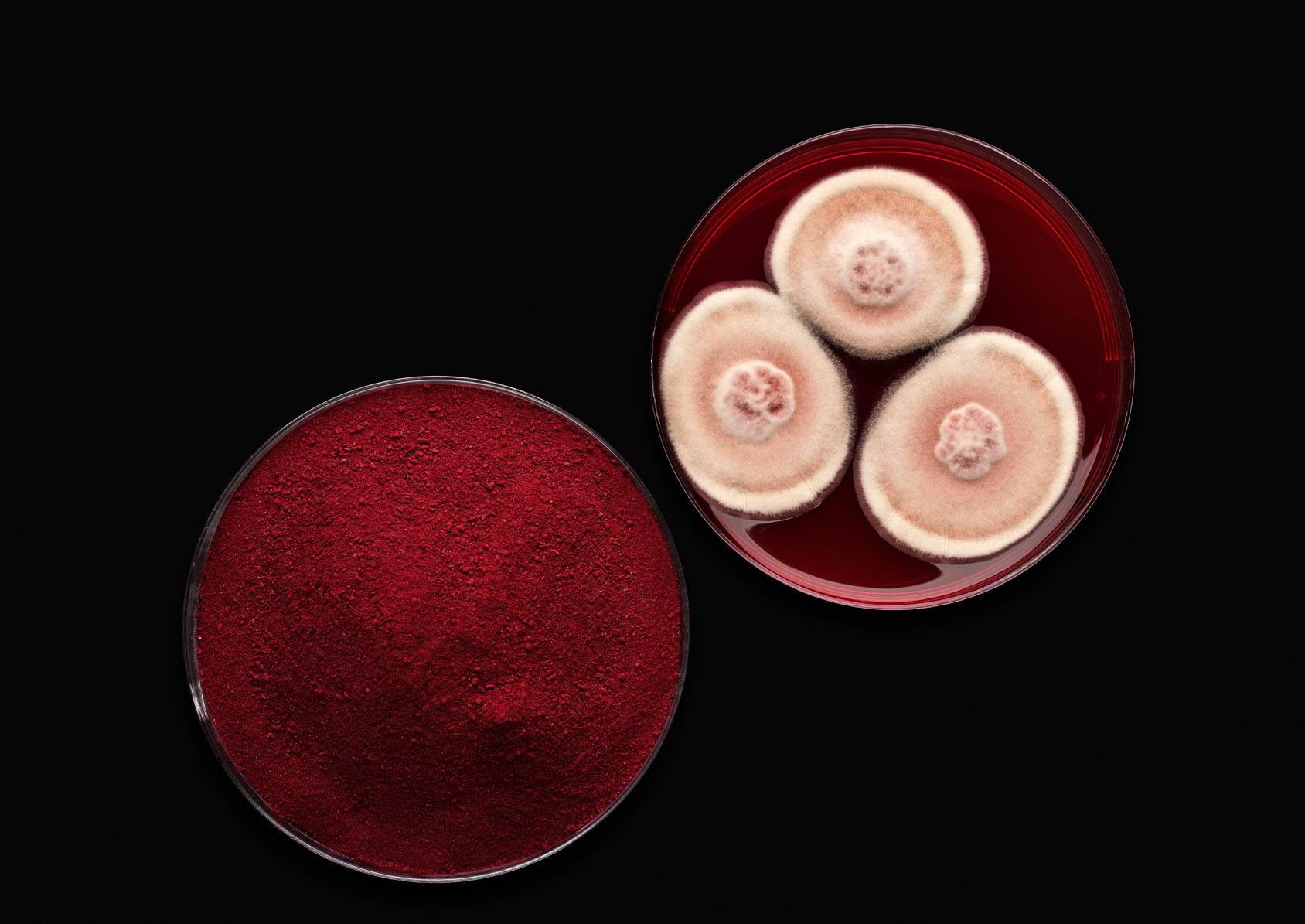

Biosolutions
Creating climate impact with nature’s own toolbox
Biosolutions
Creating climate impact with nature’s own toolbox
March 2025
Editors: State of Green
Maja Rimer
Feline Falck Christens
Iver Høj Nielsen
Joel Matias Jonsson
Emilie Rimkus Selck
Knowledge partner
Food Nation
Food and Bio Cluster Denmark
DI Biosolutions
Cases provided by 21st.BIO, Algiecel, Aquaporin, Arla Foods Ingredients, Bioli, Biomason, Biosolutions Zealand, Chromologics, Danish Technological Institute, DTU Biosustain, EvadioBio, Ferm Food, Færm, MATR, Novonesis, Visibuilt
Design
Essensen
Front page photo
Chromologics
Download this publication
Download this and other publications at stateofgreen.com/publications
For more information
To order copies of this publication or receive more information about other related publications, please contact State of Green at info@stateofgreen.com
Copyright notice
©State of Green (2025)
Foreword Biosolutions –a driver in the green transition
In a world marked by the climate crisis, resource scarcity and a growing population, the need to produce more with less impact on nature and climate has never been greater. This is where biosolutions comes in. By combining biology and technology, biosolutions can contribute to a greener and more sustainable world.
From road construction and textile management to the food and feed industries, biosolutions have industry-wide impact and even greater untapped potential. The innovative and sustainable approach to production offers a vast range of benefits – such as potentially reducing global CO2-emissions by eight percent and significantly mitigate climate change.
Biosolutions not only contribute to emissions reduction but also support broader environmental goals, such as enhancing biodiversity, reducing resource consumption and fostering a circular economy.
Denmark is a frontrunner in the field, and we have some of the world's leading biosolutions companies as well as the best conditions for start-ups and best-in-class research communities.
We pride ourselves with offering some of the best conditions for the industry and for fostering new ideas. Under the lighthouse project Biosolutions Zealand (see page 15), we have established testing, demonstration and development facilities which makes it easier for companies to develop and scale their products and solutions.
Denmark’s strong tradition of public-private climate action has enabled our start-ups, universities and biotech businesses to make global impact through cutting-edge research, innovation and technology development. With the EU presidency in 2025, Denmark is especially well-positioned to spearhead initiatives that bring public and private stakeholders together in global climate action.
We are not alone in recognising the strategic importance of biosolutions. The European Commission has identified biotechnology as a critical technology for European economic security, and it is one of three technologies prioritised in the Strategic Technologies for Europe Platform (STEP) regulation. Similarly, the Net Zero Industry Act (NZIA) recognised biotech as an important technology contributing to the EU’s resilience and decarbonisation objectives.
In the following pages, you will be introduced to Danish companies and initiatives in the biosolutions industry.
You will also be inspired by Danish companies ready to share their expertise and be presented with concrete solutions to some of the biggest challenges that the world is facing.
Enjoy the read.

Morten Bødskov Danish Minister for Industry, Business and Financial Affairs
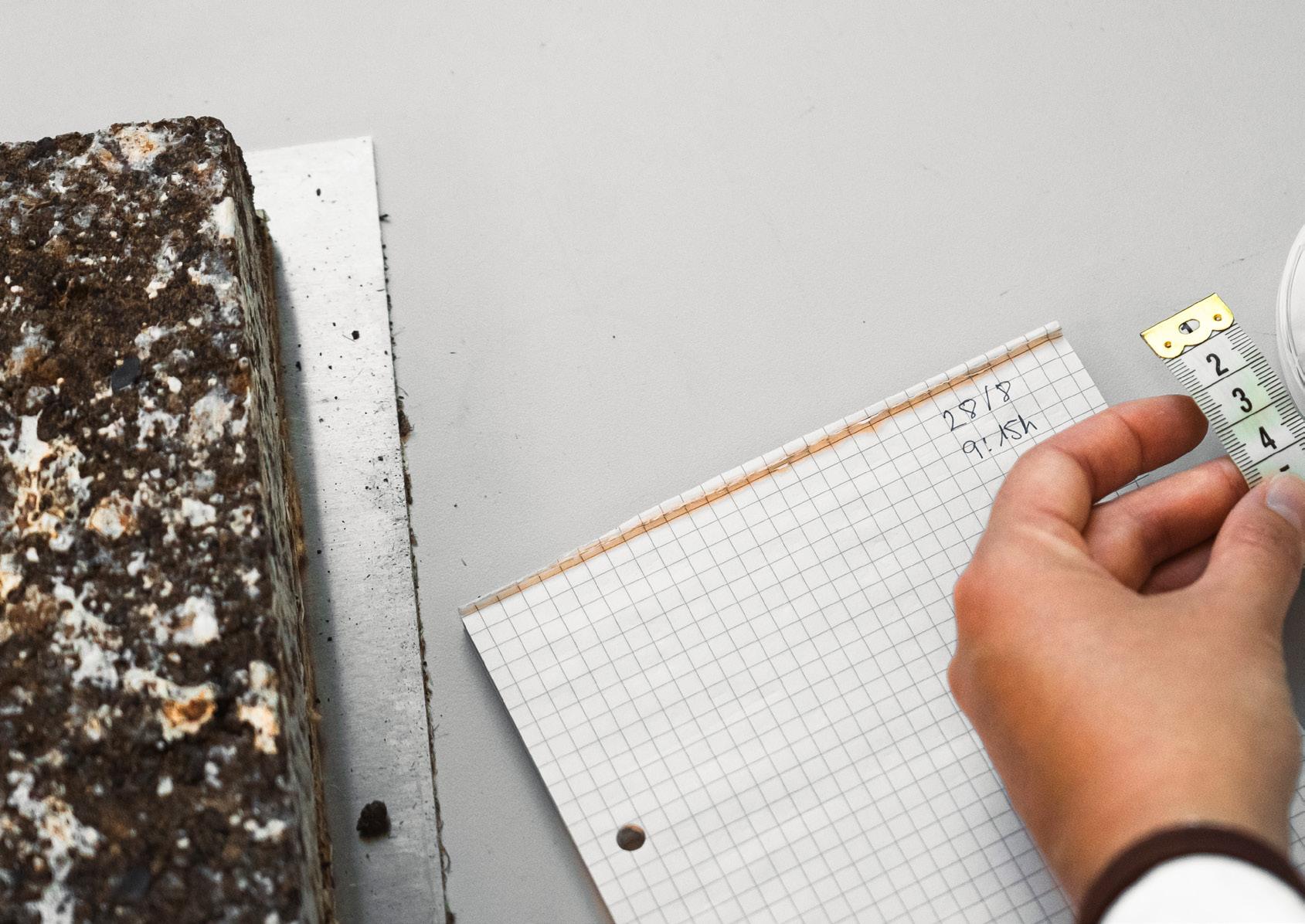
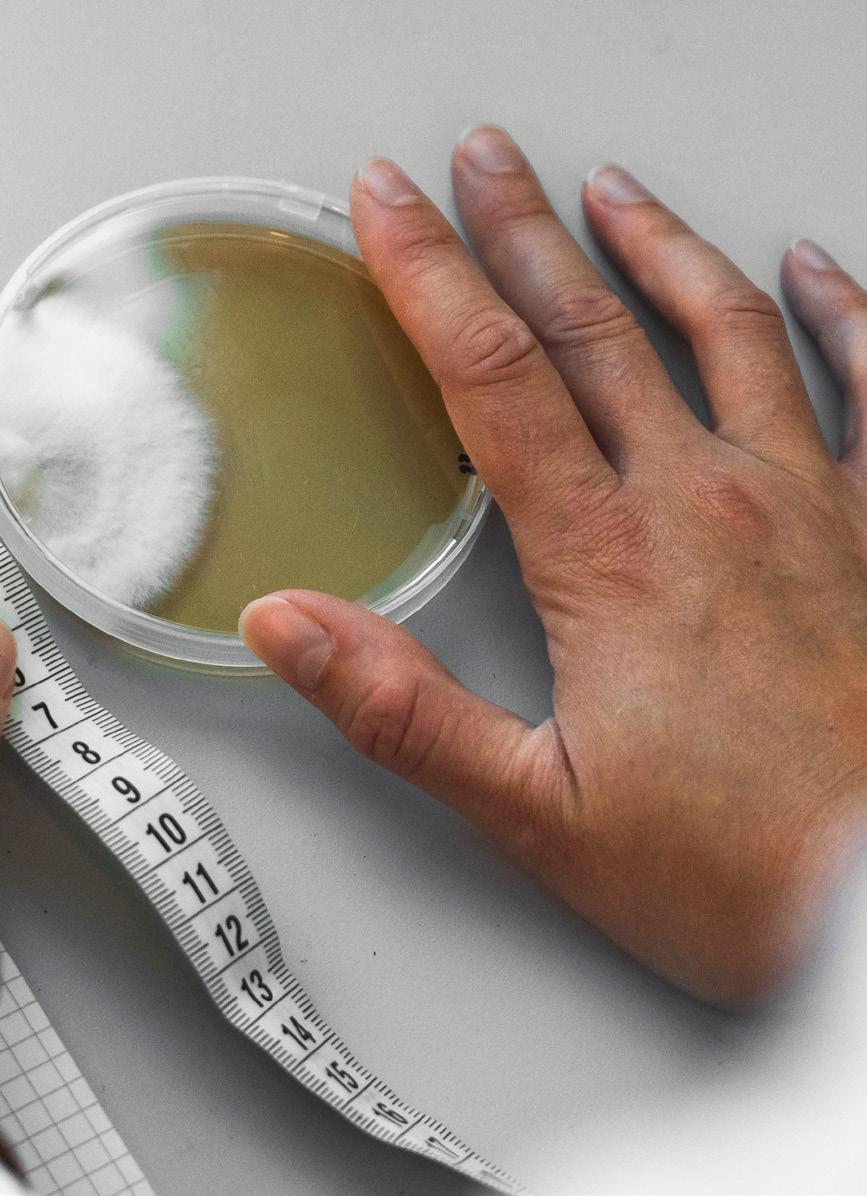
What are biosolutions?
Biosolutions have been around for thousands of years. They have been used in products such as bread, wine and cheese, but despite this, it was not until recently the term "biosolutions" was invented.
What is a biosolution?
When biology and technology come together to create a climate solution, it becomes a biosolution. Biosolutions unofficial tagline is “Inspired by nature” as they are always biologically built and not synthetic.
How do biosolutions work?
Biosolutions utilises nature’s own toolbox. A biosolution can for example be created by adding bacteria or yeast to organic carbon sources like sugar which then undergoes a fermentation process, resulting in the desired biosolution.
Biosolutions are produced in a manner which makes them a sustainable alternative to carbon-emitting and environmentally damaging products.
Where can biosolutions be used?
Biosolutions can be implemented across many sectors, from food and construction to cosmetology. In this publication, you will be introduced to a few of the many different biosolutions that Denmark has to offer including asphalt made of fungi, carbon capturing algae, plant-based meat complements, sustainable aromas and much, much more.
What is the potential of biosolutions?
Biosolutions can play a key role in the green transition. According to a report by Copenhagen Economics, the biosolutions currently at hand have the potential to cut 4,300 million tonnes of CO2 by 2030. This is equivalent of eight percent of today’s global emissions. They can also help reduce food waste, feed a growing global population and counter the current loss of biodiversity.
Due to the increasing demand for sustainable alternatives, the financial potential of biosolutions is substantial. The global market for biosolutions has the potential to grow from EUR 240 billion to EUR 640 billion in 2030. This would include an increase in high paying jobs and secure a competitive advantage in the rapidly growing green economy.
Denmark: the biosolutions centre of excellence
The term biosolution was originally coined in Denmark as an attempt to create and gather a new sector. Today the sector is rapidly evolving, and the term is increasingly spreading across the globe.
Of our current global CO2 emissions can be reduced if existing innovative biosolutions are implemented, moving us significantly closer to climate neutrality. 8%
Denmark’s legacy in biotechnology and HealthTech is internationally renowned. Emerging from this strong traditions is the Danish biosolutions sector.
The strong biotechnology foundation ensures that advanced technologies like fermentation and biorefining, the fundamentals in biosolutions, are deeply integrated in the Danish industrial ecosystem. This enables continued development and production which drives the industry forward.
A key element in this development is the strong biosolutions research community. With a dedicated academic focus on biosolutions, Denmark ranks number one globally in biosolutions research publications per capita. The academic community includes several universities, research centres and academic degrees.
The ongoing research is conducted in close collaboration with industry and private partners, ensuring awareness of society needs and market demands. This collaboration is rooted in Denmark’s tradition of private-public partnerships, which dates back to the cooperative movement of the 1800s, where farmers united to develop their sector and grow agricultural production and sale.
Today, close collaboration between businesses, knowledge institutions, and the government has created a highly developed ecosystem for startups, students, researchers, and large businesses. Interdependent and well-organised, they exchange knowledge and talents, thus accelerating development.
Several organisations further support this ecosystem by fostering the collaboration and ensuring that startups and new innovations have access to technology and capital.
Denmark is committed by law to reduce greenhouse gas emissions by 70 percent by 2030 compared to 1990 levels. To achieve this goal, the government has decided amongst other things to prioritise biosolutions through several longstanding political agreements in agriculture, innovation, academic research, and industrial policy.
The strong connection between government, industry, and research facilities in public-private partnerships makes Denmark a European centre of excellence in the field of biosolutions.
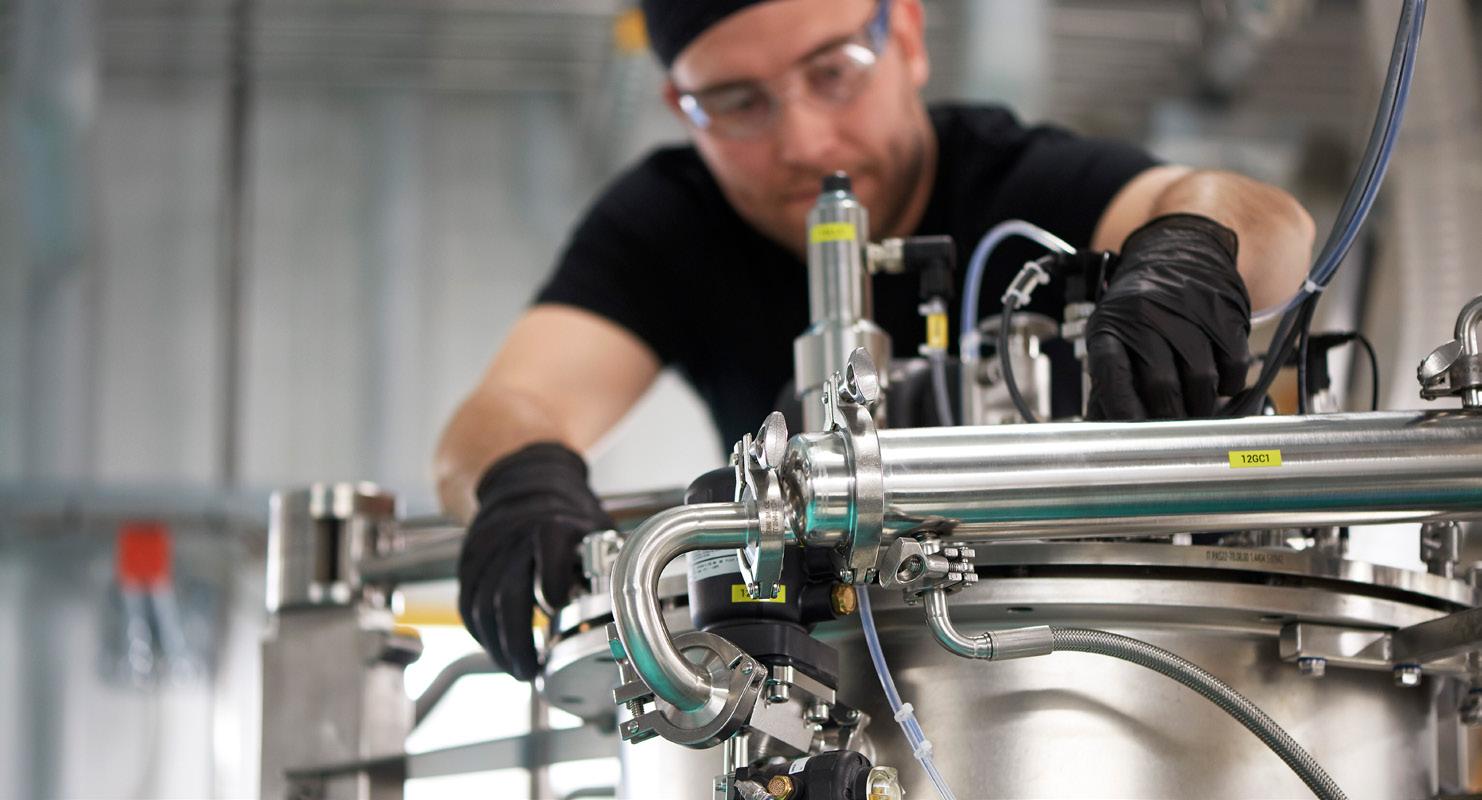
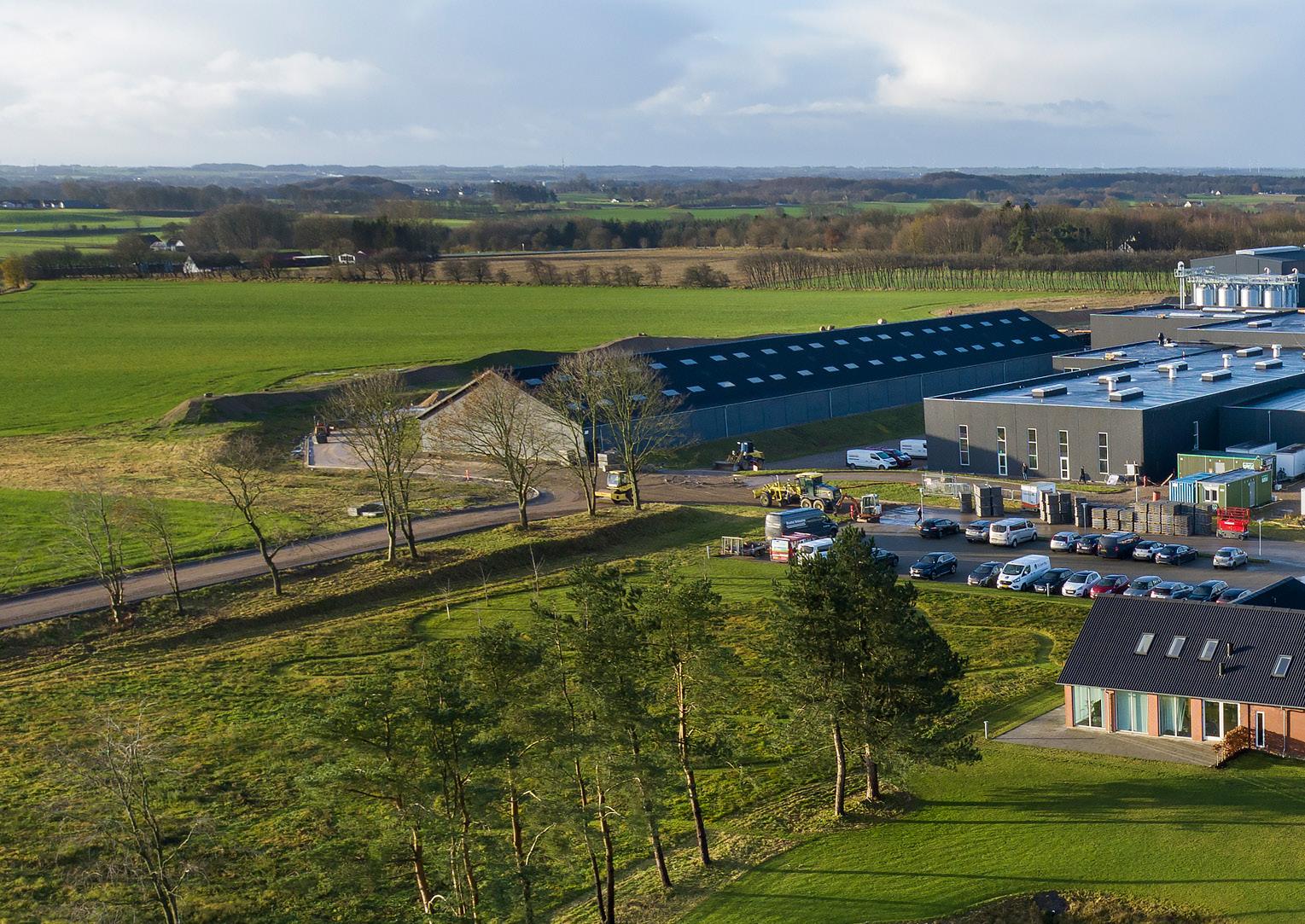
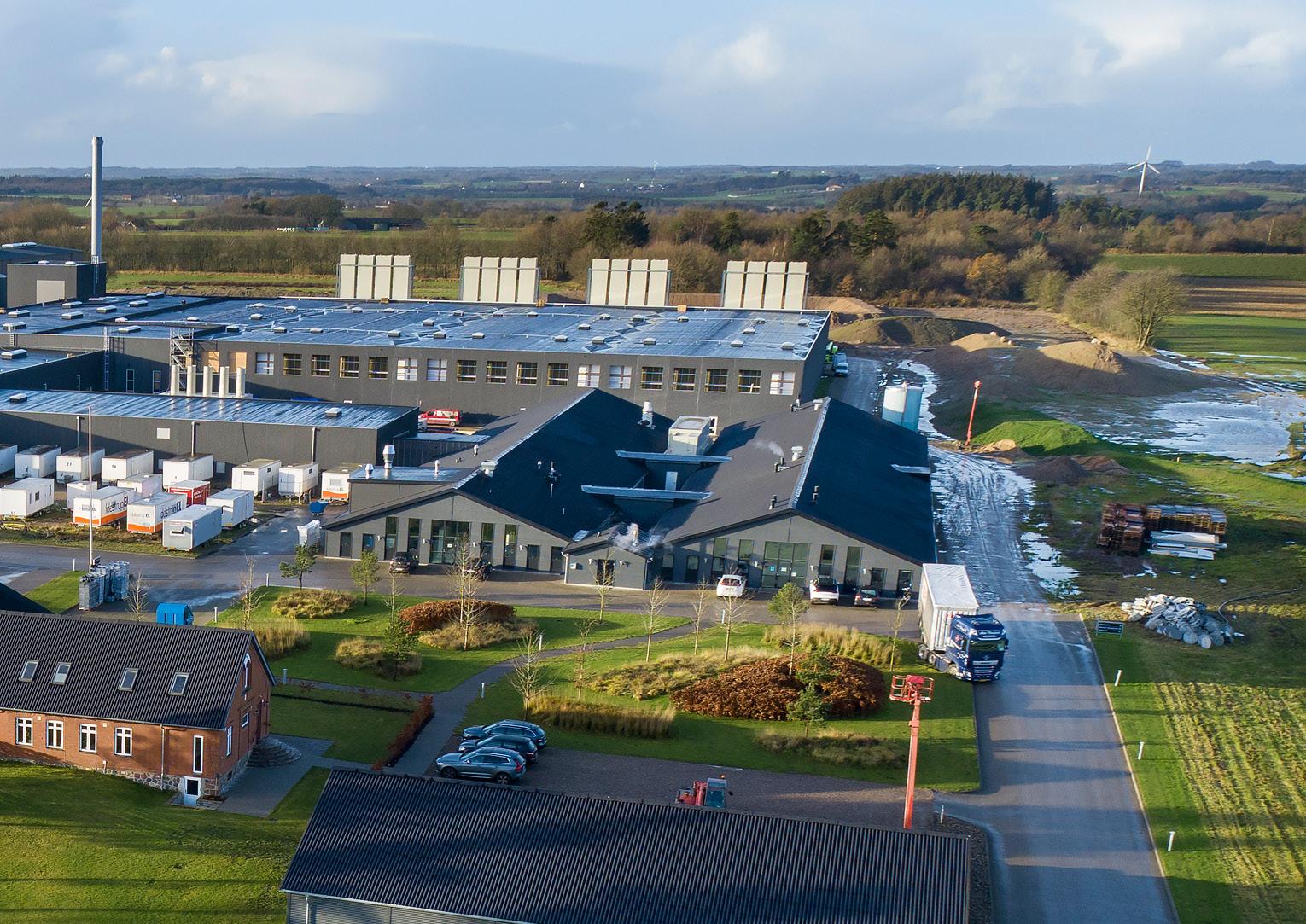
INFO
DI Biosolutions
DI Biosolutions is established under Danish Industry and is the leading biosolutions community in Denmark. It represents the interests of its 90+ members at both national and international levels.
Learn more and connect with DI Biosolutions’ network of companies across the biosolutions value chain.
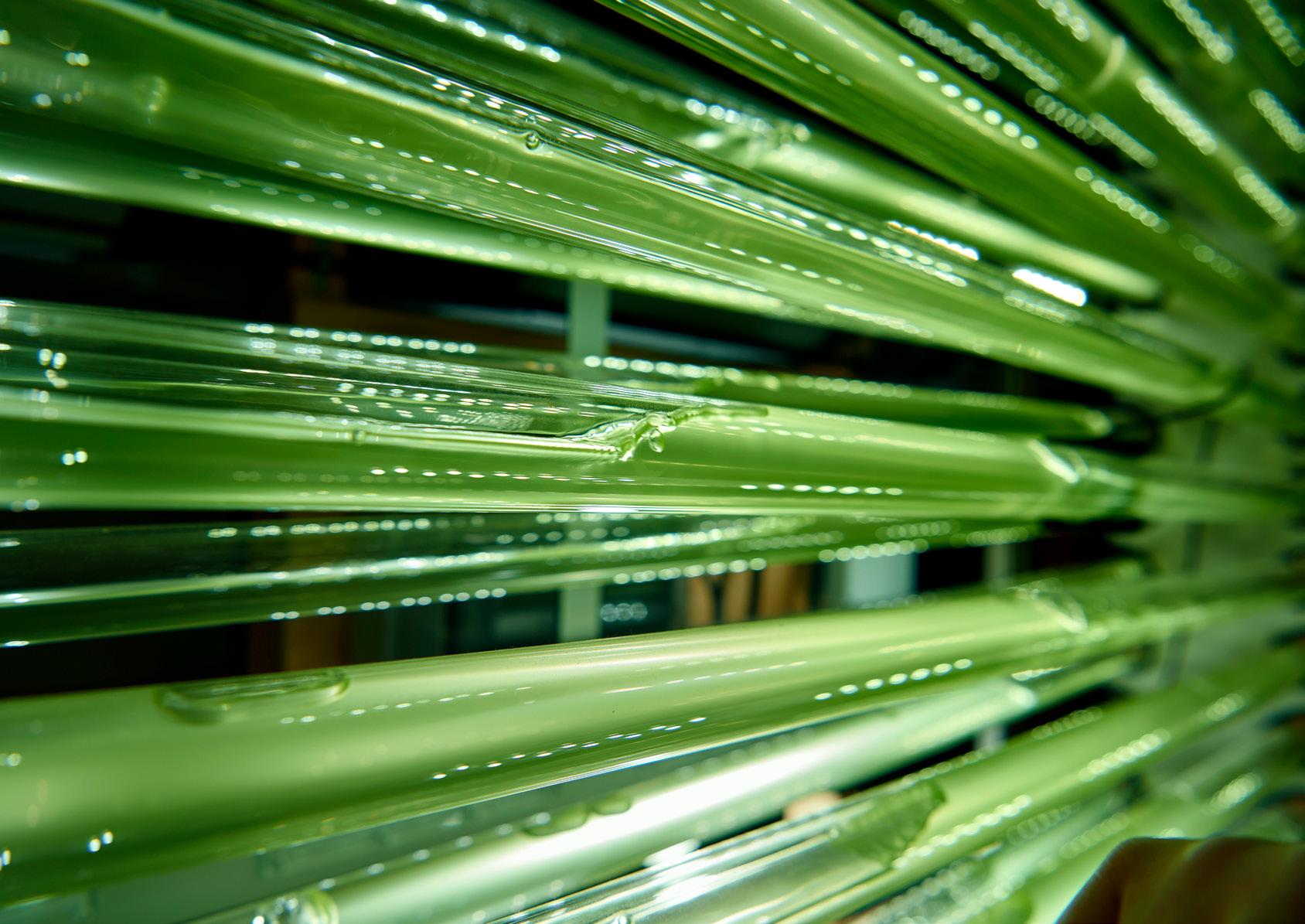

Cases Enablers
Biosolutions have the potential to support the transition from a fossil fuel-based economy to a bio-based and sustainable one. However, this transition requires scientific research, access to laboratory facilities, substantial investments, and the right infrastructure and frameworks to guide solutions from development and testing to scaling and final production.
The following cases presents four key Danish players that enable biosolutions through research and support of the ecosystem.
Danish Technological Institute
Driving green innovation through biosolutions
Biosolutions Zealand
Developing and building an international biosolution stronghold
DTU Biosustain
Research for a sustainable future
21st. BIO
Making precision fermentation technology accessible
TYPE ENABLER
SOLUTION PROVIDER DANISH TECHNOLOGICAL INSTITUTE
LOCATION TAASTRUP
Driving green innovation through biosolutions
Challenge
Industries, such as agriculture, food, construction and materials are under immense pressure to transition to sustainable production, reducing CO2 emissions and resource consumption. However, Danish companies and in particularly startups, scaleups and SMEs face significant barriers such as limited access to advanced facilities with technology infrastructure for testing and scaling, including expertise in bioprocessing, biomanufacturing and raw material optimisation.
Despite the global need for sustainable solutions, the lack of technology infrastructure and support for scaling biobased solutions slows innovation and adaptation. The challenge lies in bridging this gap, while also reducing global CO2 emissions, leveraging side streams from industries, and creating competitive, sustainable solutions.
Solution
The Biosolutions Technology Center, located in the Danish Technological Institute in Taastrup, provides state-of-the-art facilities and services to support companies in developing, testing, and scaling biobased solutions. By integrating cutting-edge technologies, the centre enables businesses to transition from laboratory concepts to pilot and industrialscale production in advanced state-of-the-art pilot facilities.
Key solutions include:
• Biorefining: Utilising agricultural and food industry side streams to extract valuable proteins, fibres, lipids and bioactive ingredients
• Fermentation: Scaling up fermentation processes for converting or producing biomass, proteins, fibres, probiotics, lipids, and sustainable materials in pilot bioreactors
• Microalgae production: Leveraging compact photoand heterotrophic bioreactors to produce high-value ingredients like omega-3 and proteins while capturing CO2 from industrial sources
• Downstream processing: Separation, extraction, purification and drying of valuable compounds and produced product
• Sector coupling: Facilitating cross-sectoral integration of biosolutions to create synergies between industries such as food, packaging and cosmetics
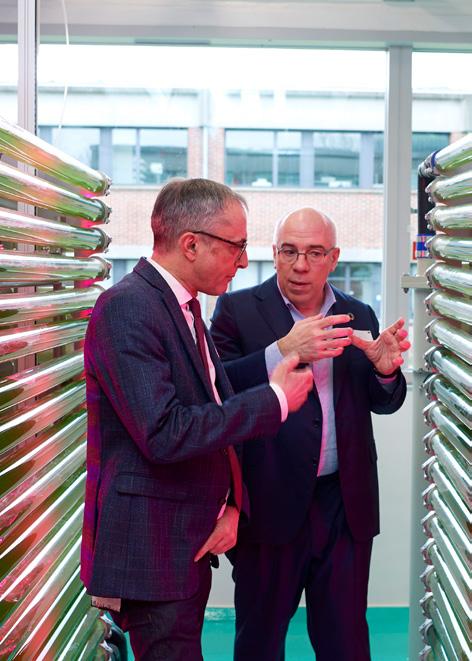
Result
The centre also offers tools like AI-driven process optimisation and data modelling, assistance with grantproposals and funding, analysis and evaluating and endof-life enabling companies to maximize resource efficiency and sustainability.
The centre is delivering measurable impacts on sustainability, competitiveness, and innovation. By 2030, the centre will facilitate at least 100 development and scaling projects annually, offering critical support to startups and SMEs. This will, amongst other things, contribute to a global reduction in CO2 emissions, minimise environmental impact and foster economic opportunities.
The centre has supported several biosolutions successes, including Visibuilt (see page 24) and Algiecel (see page 26).
TYPE ENABLER
SOLUTION PROVIDER BIOSOLUTIONS ZEALAND
LOCATION AARHUS
Developing and building an international biosolution stronghold
Challenge
The challenge of climate change demands immediate action. This requires the acceleration of all green solutions, including industrial biotechnology.
To fully harness the potential of nature’s toolbox, the entire biosolutions ecosystem must be involved – from primary producers and technology providers to private companies, investors, researchers, academics and government bodies.
A lot of the potential in biosolutions lies in the numerous startups and scaleups. The challenge here however is the transition from lab to scale-up to commercial production. This development process is often time-consuming and requires a significant amount of capital as well as access to scaling, testing and demonstration facilities.
Solution
To keep Denmark at the forefront, Biosolutions Zealand is building a world-class biosolutions business ecosystem.
The ecosystem involving universities, research institutions, authorities, industry associations and business support organisations, has been established to focus on
improving the framework conditions for the development and commercialisation of sustainable biosolutions, alongside initiating business-focused initiatives and services.
This includes funding for collaborative innovation partnerships which enables private companies to develop, test, or scale new biosolutions while strengthening ties with other businesses and research institutions.
Biosolutions Zealand also provides funding vouchers to cover some of the costs for use of test and scaleup facilities across Denmark. This makes it more affordable for SMEs and startups to test and scale their solutions. Additionally, it assists businesses in finding the right collaboration partners, technologies, suppliers, customers and scientists.
Result
The efforts within Biosolutions Zealand have already led to the establishment of new scaleup and testing facilities, the mapping of already existing Danish facilities, the creation of a free knowledge bank for biosolution-related topics and platforms for supporting ecosystem stakeholders. Furthermore, partnerships with the government have advanced the ecosystem development.
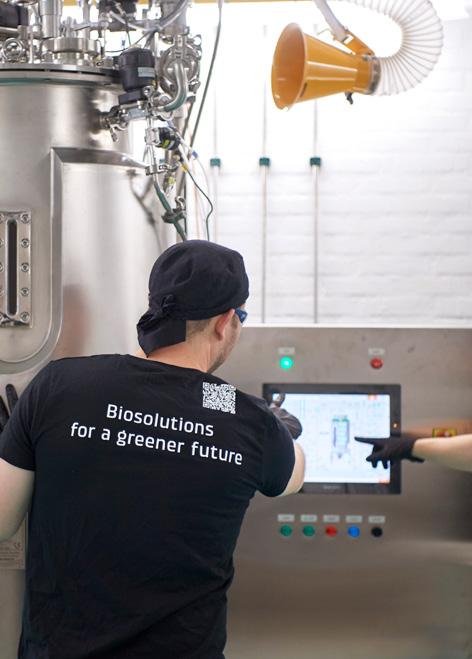
These initiatives have already supported development of innovative biosolutions and biomanufacturing technologies. Examples include converting shell waste into biomaterials, monitoring and analysing off-gas from fermentation processes, which optimises processes and conducting lifecycle assessments (LCAs) of plant-based alternatives for cultivating cell-based meat.


TYPE ENABLER
SOLUTION PROVIDER THE NOVO NORDISK FOUNDATION CENTER FOR BIOSUSTAINABILITY (DTU BIOSUSTAIN)
LOCATION KONGENS LYNGBY
Research for a sustainable future
Challenge
Today, essential commodities are manufactured from chemical materials based on fossil resources like oil and gas or extracted from plants and animals. This way of manufacturing depletes natural resources and increases carbon emissions.
Meeting a growing population’s needs for chemicals, polymers, materials, energy and food, calls for new bio-based industries and changing old industries’ petroleum-dependent technologies. This requires world-class scientific research and facilities, that use a range of techniques like high-quality big data generation and analysis, synthetic biology, precision fermentation, machine learning and AI, as well as metabolic modelling and engineering.
Solution
As the first interdisciplinary research centre in sustainability, DTU Biosustain, was initially founded to strengthen Denmark's position within advanced bioprocessing and bioengineering.
Today the centre is a global leader in the field of biosolutions with an international team of top scientists working towards establishing a biobased economy, the green transition
and specialising in creating biotechnological routes for product development.
The centre's research revolves around different sustainability criteria and is divided into three main research areas: sustainable materials, microbial foods and microorganisms for net zero agriculture.
Result
DTU Biosustain specialises in using biotechnological routes for product development with the “end-in-mind”. That means, listening and having a commercial and industrial approach taking products to market faster and more effectively. Always mindful of the needs of the market, society and environment, DTU Biosustain are continuously engaging in dialogues with the industry.
The centre directly enables the transition from conventional, unsustainable, industrial production methods and products into a more sustainable bio-based industry based on a microbial cell factory design.

The centre's research revolves around different sustainability criteria and is divided into three main research areas: sustainable materials, microbial foods and microorganisms for net zero agriculture.
TYPE ENABLER
SOLUTION PROVIDER 21st .BIO
LOCATION SØBORG
Making precision fermentation technology accessible
Challenge
The global population is both growing and ageing, creating an urgent need for increased food production –particularly proteins. Despite their ideal nutritional profile, conventional production of animal proteins cannot meet this demand sustainably.
The solutions to these challenges are out there. Precision fermentation – a biosolution that engineers microorganisms to produce specific, high-quality proteins – enables industrial-scale production with minimal environmental impact. However, promising molecular innovations often fail to make a meaningful impact or even reach commercialisation due to challenges in achieving cost-effective large-scale production.
Solution
21st.BIO was established to make industrial-scale precision fermentation technology accessible for protein production.
With a license to Novonesis’ technology, the company has already developed several industrial programmes, enabling food tech, ingredient, and dairy companies to leverage the technology platform.
This has resulted in the production of dairy proteins key to insuring the future of nutrition: beta-lactoglobulin, alpha-lactalbumin, and caseins.
Result
21st.BIO facilitates the production of essential proteins by providing access to industrial-scale precision fermentation technology. This approach has already led to the production of dairy proteins, such as 21st.BIO’s beta-lactoglobulin BLG essential+™, which offers exceptional nutrition, being rich in essential amino acids.
Precision-fermented dairy proteins such as these, have already proved that they reduce land and water use and greenhouse gas emissions by over 90 percent compared to traditional animal agriculture.
As one of the most sustainable production methods, precision fermentation is set to play a critical role in securing global supply chains and ensuring regional or national food self-sufficiency.
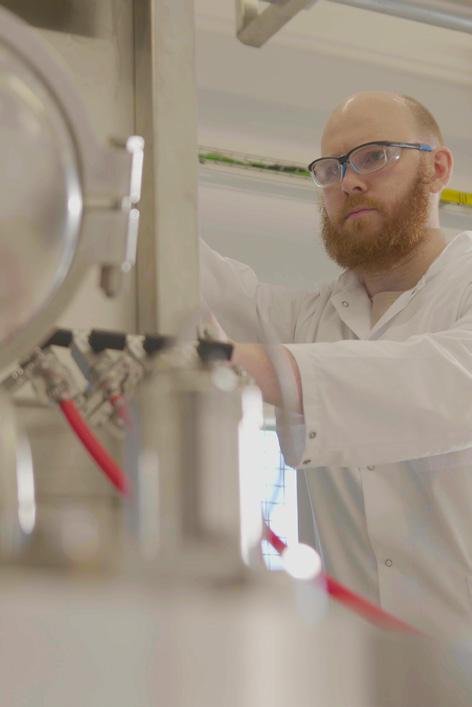
Precision-fermented dairy proteins can reduce land and water use and greenhouse gas emissions by over 90 percent compared to traditional animal agriculture. 90%

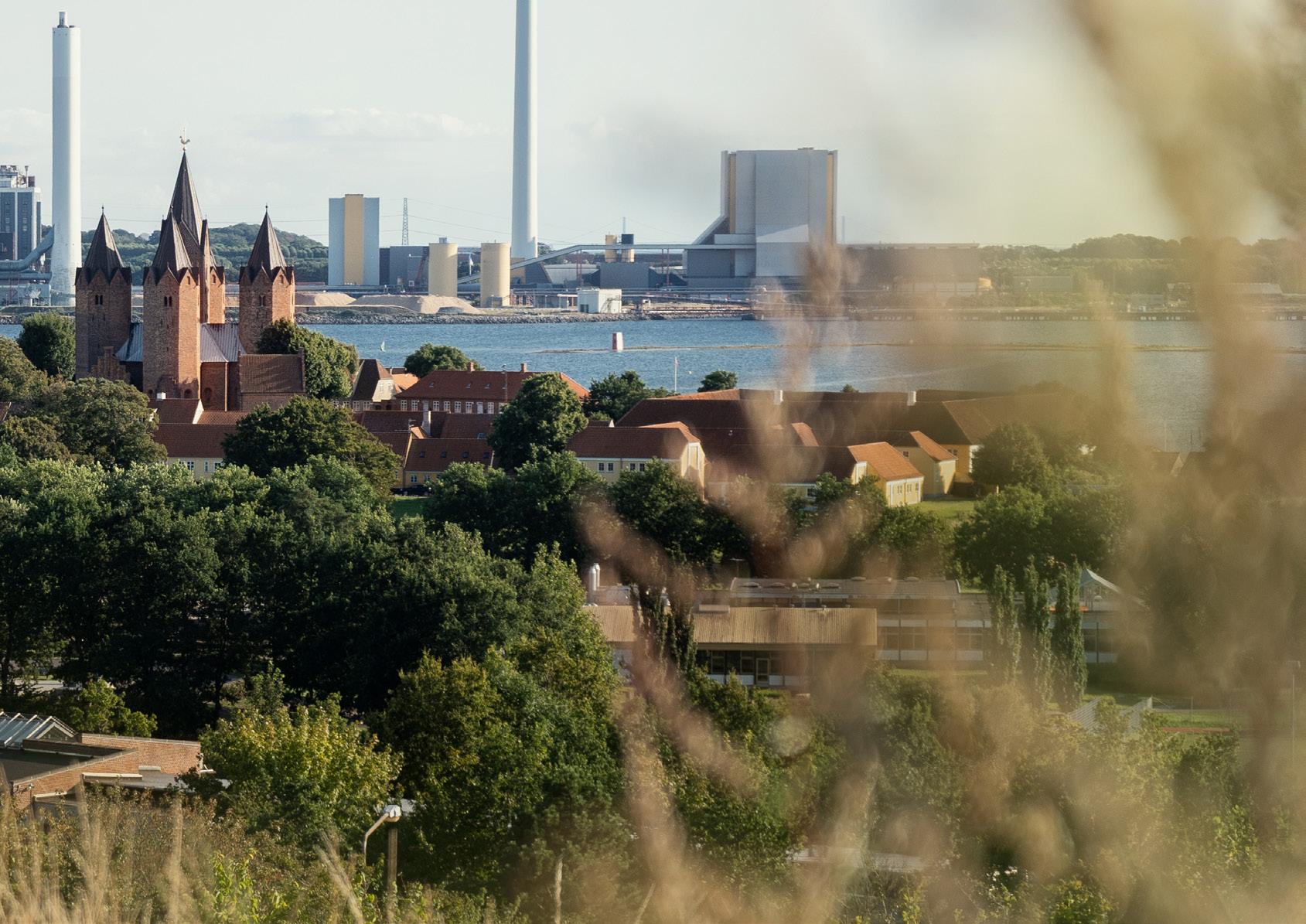
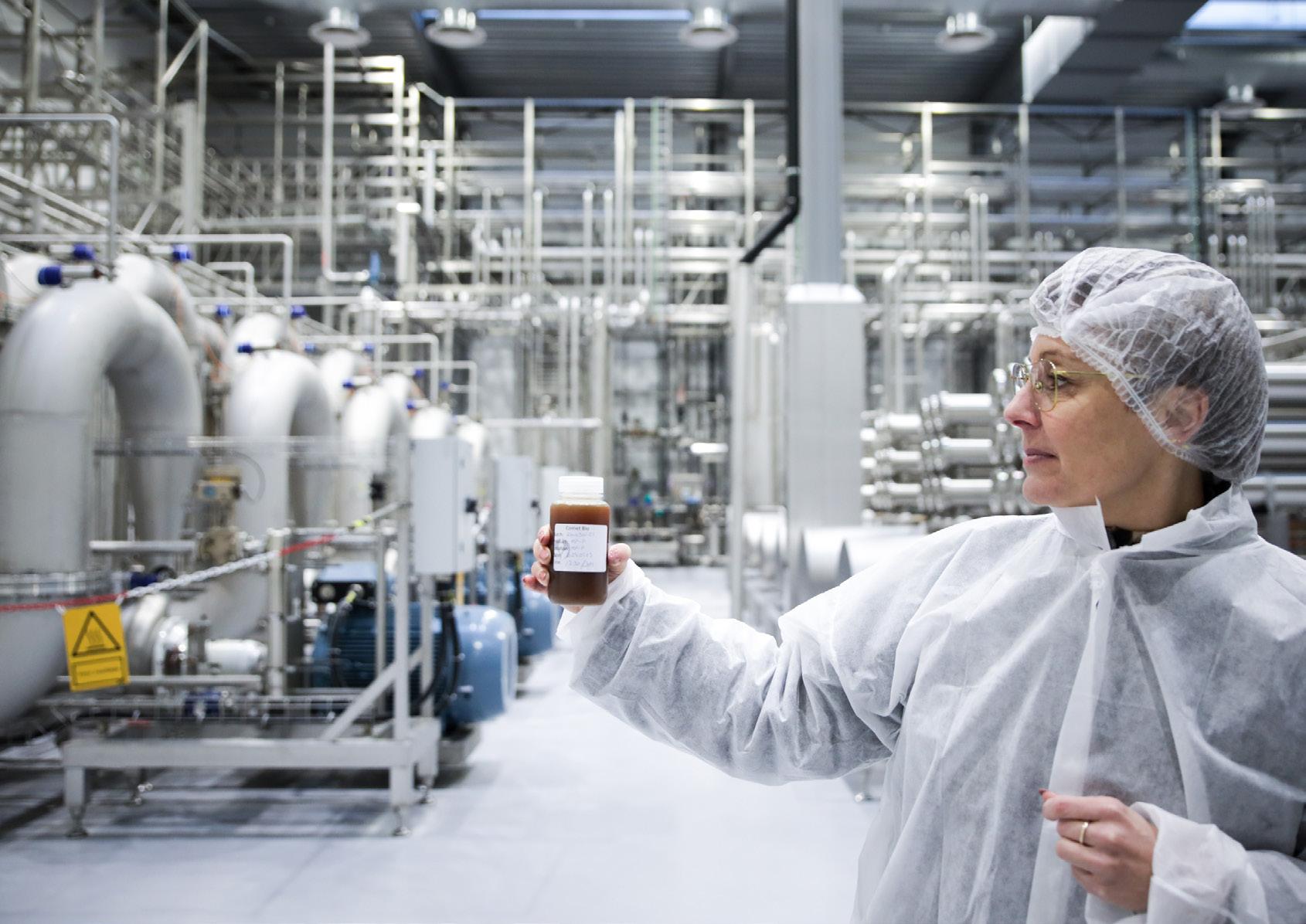
INFO
State of Green
State of Green is your one-point entry to Denmark’s green transition.
As a not-for-profit, public-private partnership, State of Green connects international partners with Danish companies, changemakers, agencies, experts and researchers to accelerate the global transition towards a sustainable, net-zero future.
PHOTO:
Cases Industry
Across various sectors, the demand for greener products continues to grow and companies are seeking ways to make their production more sustainable. This includes reducing dependence on fossil fuels, minimising energy consumption, decarbonising value chains and adopting circular economy models.
The next cases are biosolutions in varieties of sectors, from construction to cosmetology.
Novonesis
Recycling plastic with enzymes
Biomason
Using nature's blueprint to rethink cement
Visibuilt
Paving the way for sustainable road construction
Aquaporin
Using aquaporin protein in water cleaning
Algiecel
Carbon captioning algae
Bioli
Improving skin and environmental health with biotech skincare
SOLUTION PROVIDER NOVONESIS
LOCATION BAGSVÆRD
Recycling plastic with enzymes
Challenge
Plastic's versatility makes it indispensable. It’s durability, however, poses environmental challenges, as it is hard to break down and reuse. It is estimated that of the seven billion tonnes of plastic ever produced, less than 10 percent has been recycled.
By 2060, global plastic consumption is projected to triple, with more than half of all plastic waste ending up in landfills and less than 20 percent being recycled. The EU Commission has proposed new regulations requiring packaging to consist of 30-35 percent recycled materials by 2030. However, the current shortage of recycled plastic poses significant challenges for companies in meeting these requirements. To reduce plastic pollution and address the growing demand for recycled materials, producing, using and recycling plastic must be innovated.
Solution
Developing eco-friendly plastics is challenging due to the variety of plastics differing properties, compositions, and recyclability. To tackle this, Novonesis is working with its French partner Carbios to scale up an innovative enzyme technology.
This technology enables the recycling of what has so far been non-recyclable plastic waste from packaging and textiles, as well as the creation of biodegradable plastics from materials that cannot be recycled.
The focus is on polyethylene terephthalate (PET)-based plastic products, developing biosolutions that reduce the need for virgin plastics derived from fossil-based feedstocks, minimising plastic pollution and advancing the transition to a circular economy for a more sustainable future.
Result
PET plastic can only undergo a limited number of mechanical recycling processes before its quality diminishes, requiring the addition of virgin plastic. This increases plastic demand and waste generation. Further, mechanical recycling of PET plastic reduces its quality, limiting usability, particularly for mixed and coloured plastic types.
The new enzyme technology breaks down PET plastic into its original building blocks, which can be recycled into rPET (recycled PET) with the same high quality as virgin fossil-based plastic. This enables the recycling of plastic waste into everything from fleece sweaters to food-grade quality beverage bottles.
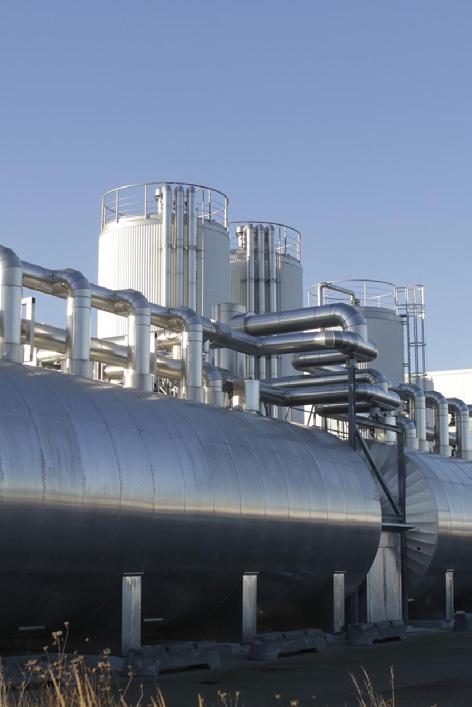
Novonesis will supply the enzyme for the world’s first full-scale factory for biological plastic recycling, which Carbios together with Indorama Ventures aim to open in 2025.
The plant is expected to produce 50,000 tonnes of rPET annually, equivalent to two billion plastic bottles, by breaking down used PET from, for example, packaging and trays, thereby reducing CO2 emissions.
TYPE INDUSTRY
SOLUTION PROVIDER BIOMASON
LOCATION IKAST
Using nature's blueprint to rethink cement
Challenge
Cement is used in concrete production worldwide. However, the manufacturing process have a heavy impact on the environment as it generates a significant amount of greenhouse gas emissions.
Cement production generates eight percent of global CO₂ emissions, primarily due to two factors. First, limestone must be heated to 1,400–1,500 degrees Celsius, which requires copious amounts of fossil fuels to be burned. Second, the associated calcination reactions inherent to cement production release large volumes of carbon dioxide into the atmosphere.
As the second most used substance on Earth after water, the demand for concrete continues to rise. This growth intensifies the need for alternative, climate-friendly production technologies.
Solution
Biomason, a biotechnology company, has developed a biological alternative to conventional cement using microorganisms and natural processes. Their sustainable concrete product is created though a mixture of sand, bacteria and nutrient-rich water.
During the fermentation of the mixture, billions of bacteria create crystals of calcium carbonate much like coral reefs which have been making durable structures for millions of years.
Biomason’s first factory in Denmark produces concrete precast tiles for customers. It uses the same industrial equipment found in paver and block factories, including a mixer and a press, with feeding and curing systems adapted so that biocementation can occur.
Result
Biomason’s mission is to eliminate the dependency on carbon-intensive construction materials. Their product biocement has the potential to reach a near-zero carbon footprint compared to traditional cement by eliminating the need for fossil-fuel-fired furnaces and the calcination of limestone, the two largest sources of CO₂ emissions in conventional cement production.
This revolutionary approach not only minimises environmental impact but also provides a sustainable solution for the construction industry, supporting the transition to a low-carbon future.
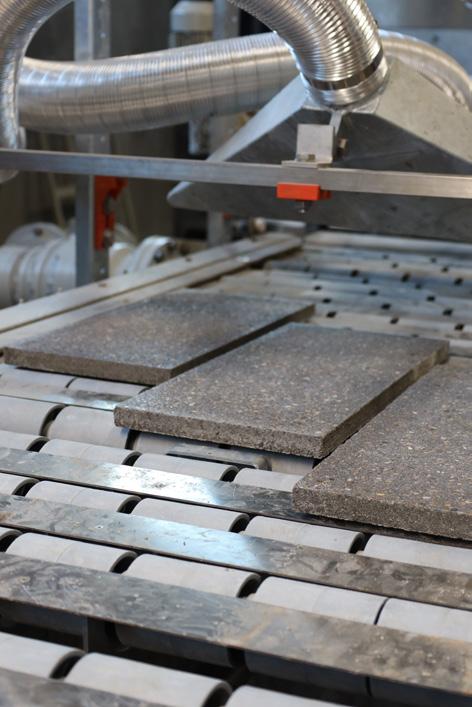
Cement production generates eight percent of global CO₂ emissions . 8%
SOLUTION PROVIDER VISIBUILT
LOCATION TAASTRUP
Paving the way for sustainable road construction
Challenge
As the world’s population grows, so does the need for infrastructure, and with it, asphalt. Despite its simplicity, asphalt has remained largely unchanged for a century, presenting challenges due to its binder, bitumen, which is derived from crude oil residue.
Producing asphalt involves oil extraction, a significant source of greenhouse gas emissions. Furthermore, the process requires heating to temperatures as high as 200 degrees Celsius, making it highly energy intensive.
Solution
To meet the EU Commission’s European Green Deal goal of climate neutrality by 2050, asphalt production needs a major transformation.
The startup Visibuilt is currently developing visiBIT, an eco-friendly alternative to traditional asphalt production. visiBIT replaces bitumen with a binder derived from mycelium, the root structure of fungi. Through a specialised fermentation process, Visibuilt uses nature’s own tools to create a sustainable asphalt production.
By replacing harmful, fossil-based material with innovative and more sustainable alternatives, Visibuilt
aims to reduce energy consumption, lower CO2 emissions, and eliminate dependence on fossil fuels while honouring the traditions of asphalt and preserving the functionality of road infrastructure.
Result
Asphalt is comprised of 95 percent stone and five percent bitumen, but by substituting bitumen with visiBIT, energy consumption and CO2 emissions during production can be reduced by more than 80 percent.
Additionally, asphalt made with visiBIT can be constructed at room temperature, significantly improving working conditions and eliminating risks associated with petroleum products.
Visibuilt envisions transforming asphalt from being black, fossil-based and out of step with the green transition to being circular, eco-friendly and inspired by nature.
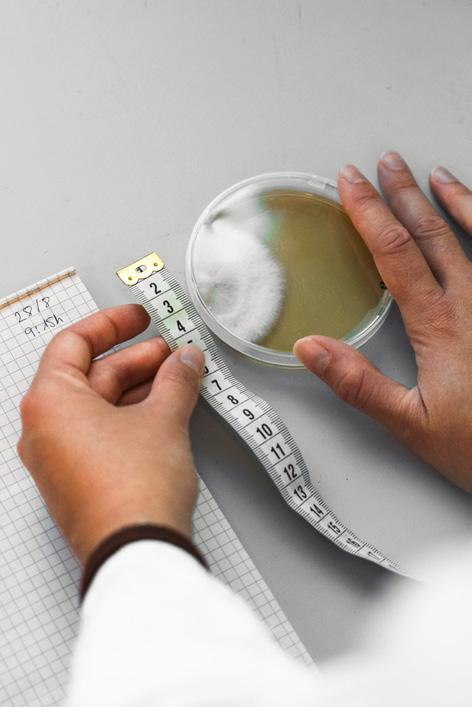
By substituting bitumen with visiBIT, energy consumption and CO2 emissions during asphalt production can be reduced by more than 80 percent. 80%
TYPE INDUSTRY
SOLUTION PROVIDER AQUAPORIN
LOCATION KONGENS LYNGBY
Using aquaporin protein in water cleaning
Challenge
With only one percent of the world’s water being drinkable, cleaning water efficiently is crucial. Reverse osmosis is a common method for water purification, but it is highly energy intensive.
Municipal wastewater treatment plants often rely on conventional anti-fouling brackish water membranes to improve operation stability. However, these membranes have high rejection rates and are not energy efficient.
Solution
By mimicking nature’s water cleaning system, Aquaporin has developed the Aquaporin Inside® CLEAR series. This technology replicates the aquaporin protein, the protein that transports water, and only water, in and out of cells.
Part of every living cell, aquaporins are essential for life on Earth. The protein’s filtering process, perfected over billions of years, is vastly more efficient than any man-made system.
By using biology, chemistry, and physics, Aquaporin’s filters use this protein in brackish water reverse osmosis membrane elements, designed for industries, municipalities and businesses.
The solution delivers energy efficiency, operational stability and high-quality permeate in wastewater recycling processes.
Result
The aquaporin protein functions as a "superhighway" for water. A single gram of aquaporins can filter 700 litres of water per second, compared to the 50 litres per hour filtered by one square metre of synthetic membranes.
Additionally, the Aquaporin system operates at significantly lower pressures, reducing energy consumption by 30 percent. This translates to lower operational costs and a substantially smaller carbon footprint for plant operators.
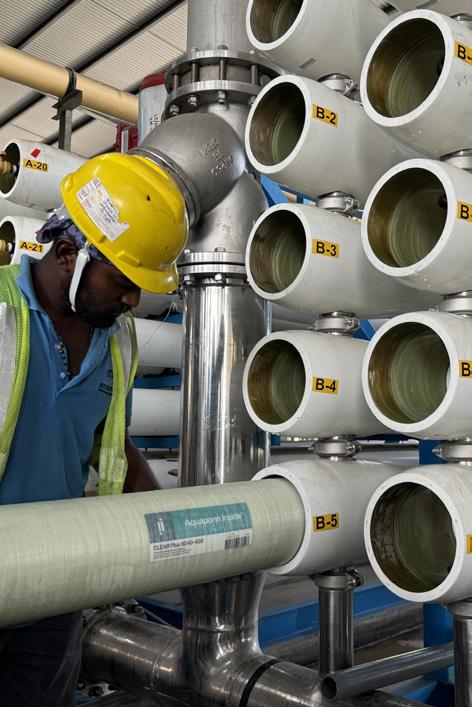
A single gram of aquaporins can filter 700 litres of water per second .
SOLUTION PROVIDER ALGIECEL
LOCATION ODENSE
Carbon captioning algae
Challenge
The food, feed, and cosmetics industries face growing challenges in meeting the demands of a rising population. These sectors rely heavily on fish oil, beef, and coconut oil, which are often associated with unsustainable production practices.
Many companies aim to lower their greenhouse gas emissions. While larger corporations can adopt Power-to-X projects or implement carbon capture and utilisation technologies, SMEs often lack these opportunities. SMEs encounter barriers such as limited availability and high costs of carbon capture technology, which hinder their efforts to embrace circular economy models.
Solution
The Danish company ALGIECEL has developed a carbon capture utilisation technology, an all-in-one biosolution for decarbonisation. Its microalgae photobioreactor (PBR) uses saltwater and LED lights to transform CO₂ into microalgae through photosynthesis.
The resulting nutrient-rich microalgae can be processed into bio-oils and biomass, offering eco-friendly alternatives to traditional, environmentally damaging ingredients in food, feed and cosmetics.
Compact and designed for plug-and-play integration, the photobioreactor aligns with onsite CO₂ emitters, enabling sustainable production across diverse industries. With minimal water and space requirements, the technology is particularly suited to SMEs, helping them to reduce greenhouse gas emissions and adopt circular economy models.
Result
By adopting ALGIECEL’s photobioreactor, the food, feed, and cosmetics industries can align their production processes with evolving climate and sustainability requirements. SMEs can also implement circular business models, reducing resource consumption and minimising waste.
Using microalgae as an ingredient instead of fish or coconut oil can help preserve marine biodiversity, often threatened by fish oil production, and reduce deforestation associated with coconut oil cultivation.
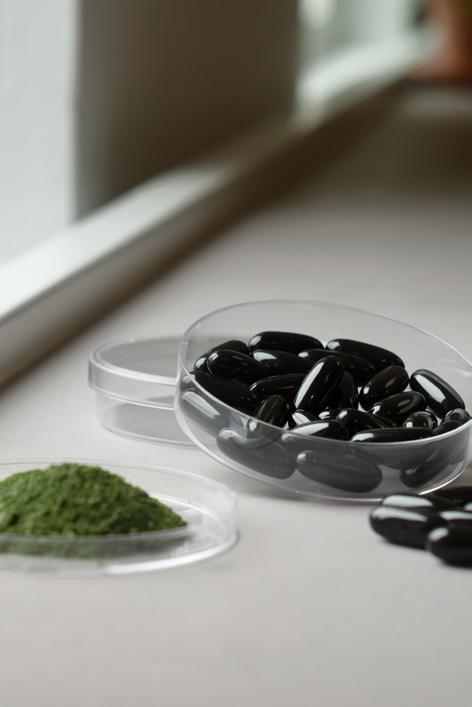
SMEs can implement circular business models, reducing resource consumption and minimising waste.
PHOTOS: ALGIECEL
TYPE INDUSTRY
SOLUTION PROVIDER BIOLI
LOCATION SØBORG
Improving skin and environmental health with biotech skincare
Challenge
The global skincare industry has largely escaped scrutiny regarding its environmental impact, despite millions of products being sold daily. While natural skincare is often seen as eco-friendly, sourcing ingredients can result in depleting agricultural land, competition with food sources, as well as requiring a significant amount of clean water and energy, resulting in severe greenhouse gas emissions.
Many widely used skincare ingredients are not biodegradable, contribute to water and air pollution and most come in packaging materials like glass and plastic, ending up as environmental waste.
Combined with the growing issues regarding skin health these challenges creates a pressing need to focus on better and more sustainable solutions in the skincare industry.
Solution
After three years of development with field experts, formulators and scientists in collaboration with the Novo Nordisk Foundation’s Centre for Biosustainability, Bioli have introduced a new series of biotech skincare products designed with sensitive skin and the environment in mind, the development process was guided by strict criteria that
addressed both skin and environmental health:
• Leveraging biotech and enzyme technology as hero technology that mimics nature, providing the foundation for effective skincare without depleting resources, harming the environment or causing skin irritation
• Allowing only ingredients that are completely biodegradable, enzyme-compatible and mainly biotech-produced to minimise resource extraction and depletion and ensure consistency in every product
• Using only biodegradable, home-compostable packaging without plastic or glass and keeping packaging at a minimum and locally sourced
Result
This process has resulted in six defined products with the first unisex product, Moisturising and Protecting Day Cream, which was launched in early 2025.
The product provides high antioxidant activity, protecting the skin against environmental stressors, powered by BioProtect, an enzyme-based technology using Superoxide Dismutase. Compared to the commonly used Vitamin C, this reduces water and energy use by 80 percent and
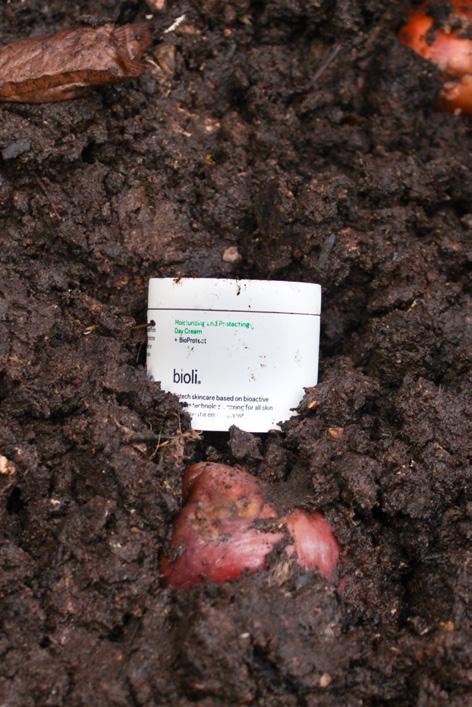
cuts CO₂ emissions by 30 percent. Plant-based enzymes further minimise environmental impact, using 50 percent less land, 10 percent less fossil energy and emits 30 percent less CO₂.
The cream is made from 100 percent biodegradable ingredients and packaging. The container, derived from fermented microorganisms, biodegrades in home composting systems after use, leaving no trace.


INFO
Food Nation
Food Nation is a non-profit public-private partnership established by the Danish government and leading private organisations and companies.
It is your gateway to information about the Danish agriculture and food sector and know-how that can accelerate the growth of international business through better solutions, innovative products and trusting cooperation.
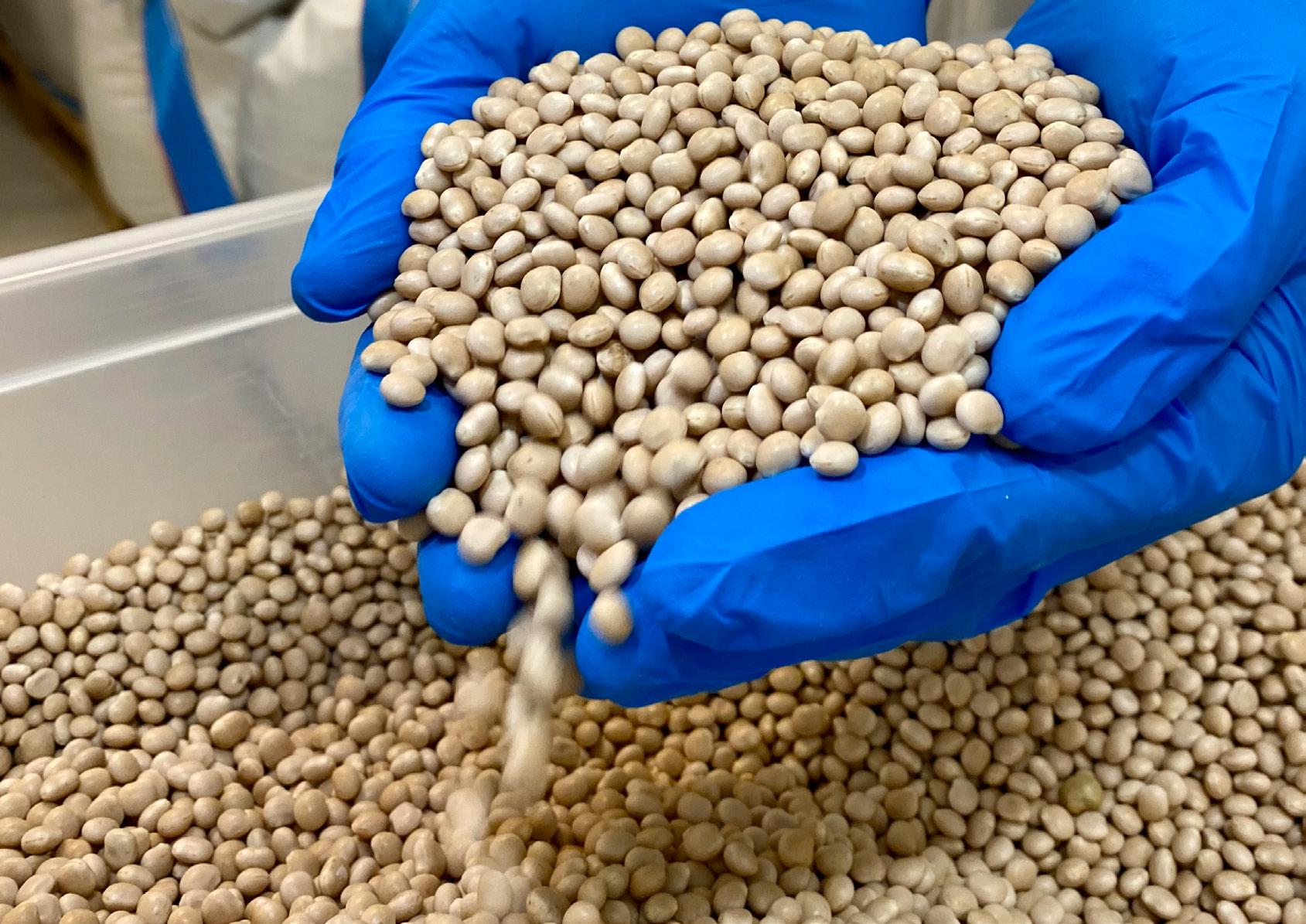

PHOTO: MATR
Cases Food
The food sector faces numerous challenges. By 2050, we will need 70 percent more agricultural land to meet the demand of a growing global population with the current agricultural methods. Traditional farming continues to deplete natural resources and threaten biodiversity, and food production needs to become climate resilient to accommodate global climate changes.
There is (bio)solutions to all these challenges, some of which you will discover in the following cases.
MATR
Plant-based food that MATR
FERM FOOD
Fermented ingredients for clean-label foods
Arla Foods Ingredients
Reducing food waste with black soldier fly larvae
FÆRM
Plant-based cheese with easy-to-implement technology
EvodiaBio
Creating natural flavours by mirroring nature itself
Chromologics
Natural colours crafted by fermentation
SOLUTION PROVIDER MATR
LOCATION COPENHAGEN
Plant-based food that MATR
Challenge
Global food production accounts for a significant share of greenhouse gas emissions and resource use, particularly through traditional meat production. Livestock farming consumes large amounts of water, land, and energy, contributing to deforestation and biodiversity loss.
With a growing global population there is a pressing need to produce more food with fewer resources to ensure food security and combat climate changes. Shifting dietary habits towards plant-based proteins is one strategy to achieve this, but barriers persist.
Despite rising consumer interest, only a fraction of individuals actively reduce meat consumption due to taste preferences, nutritional concerns and accessibility.
Solution
The food-tech startup, MATR Foods, has developed a new generation of plant-based meat alternatives. Using just five organic ingredients: oats, split peas, lupins, beetroots and potatoes, all sourced from local farms. They employ fungal fermentation, an ancient technique that creates a product with a meat-like texture, flavour and umami taste.
The fermentation process is versatile, allowing a adaptation of the method to a variety of crops, making it scalable and applicable across diverse agricultural contexts globally. MATR Foods’ approach also helps meet consumer demands for sustainable and flavourful meat alternatives.
Result
Replacing 30 percent of global meat production with plant-based alternatives like MATR Foods’ products has the potential to reduce CO₂ emissions by three billion tonnes annually. Moreover, this shift could free up to 15 percent of the world’s agricultural land, enabling it to be repurposed for reforestation and biodiversity restoration.

3 billion
Replacing 30 percent of global meat production with plant-based alternatives like MATR Foods’ products has the potential to reduce CO₂ emissions by three billion tonnes annually.
PHOTO: MATR
Fermented ingredients for clean-label foods
Challenge
Today’s consumers are increasingly aware of how their dietary choices affect their health and the environment. The modern diet is heavily reliant on processed foods, which, while convenient, often contain high levels of additives, preservatives and ultra-processed ingredients with little nutritional value. Those looking for healthier, cleaner and more sustainable options often find limited alternatives.
Solution
FERM FOOD has developed a range of fermented ingredients that help food producers meet the growing demand for clean-label foods. These ingredients are created using fermentation, where lactic acid bacteria produce lactic acid and other bioactive compounds. FERM FOOD also employs specialised techniques, including solid-state lacto-fermentation and lacto-fermentation.
Solid-state lacto-fermentation is a dry process that preserves the natural composition of nutrients in plants, grains and vegetables. This method reduces processing steps and waste while conserving water and energy, making it a cost-efficient and sustainable alternative.
Lacto-fermentation enhances the nutritional profile of plants, grains and vegetables by reducing antinutrients and increasing the bioavailability of proteins, fibres, minerals and vitamins. It also adds functionality, helping fermented ingredients to bind, fill, texturize and naturally extend the shelf life of food products.
Result
FERM FOOD’s fermented ingredients offer a cost-efficient, plant-based alternative to additives and ultra-processed ingredients. They are ideal for a wide range of food categories, including baked goods, hybrid meat products, spreads and plant-based foods.
Compared to conventional plant ingredients, FERM FOOD’s fermentation technology significantly reduces environmental impact, with an expected CO₂ reduction of up to 60 percent.
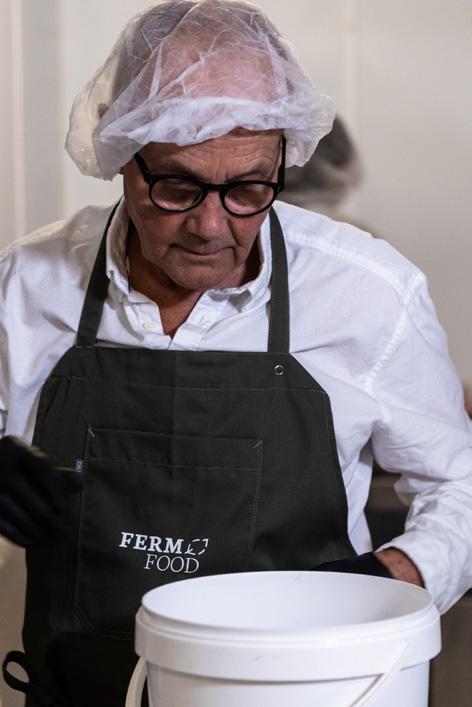
60%
Compared to conventional plant ingredients, FERM FOOD’s fermentation technology significantly reduces environmental impact, with an expected CO₂ reduction of up to 60 percent.
PHOTO: FERM FOOD
TYPE FOOD
SOLUTION PROVIDER ARLA FOODS INGREDIENTS
LOCATION VIDEBÆK
Reducing food waste with black soldier fly larvae
Challenge
Arla Foods Ingredients’ (AFI) production site Danmark Protein is one of the world’s largest processing facilities for whey-based products, permeate, and lactose. These elements are the basics in the production of sports, health and infants food products.
The by-product of Danmark Protein’s lactose production, delactosed permeate (DLP), has traditionally been considered food waste, despite efforts to repurpose it as animal feed. Due to its high mineral content, DLP poses challenges in livestock feeding, as it causes blockages in valves and pipes. Although nutritionally suitable for pigs, it is impractical to use, as it negatively affects wet feeding systems.
DLP has therefore been sold as food waste to biogas plants, as a substrate for methane production.
Solution
To tackle this food waste issue, AFI has partnered with ENORM, Northern Europe’s largest state-of-the-art insect farm, based in Flemming, Denmark. Instead of being discarded as biogas substrate, DLP is now upcycled into valuable feed material for black soldier fly larvae.
Black soldier fly larvae can play a crucial role in the environmentally friendly development of the agricultural and food industry as they are used for insect feed and insect oil. These can be used to feed a variety of animals, including fish, poultry, pigs and pets.
Result
Converting DLP from a biogas substrate to a valuable feed material has significantly reduced food waste at Danmark Protein. With ENORM’s production facility reaching full capacity in spring 2025, Danmark Protein will deliver 30,000 mega tonnes of DLP annually. This will ensure that approximately 4,000 mega tonnes of lactose are repurposed as feed material instead of biogas production.
For Danmark Protein, this initiative will lead to a 16 percent reduction in food waste.
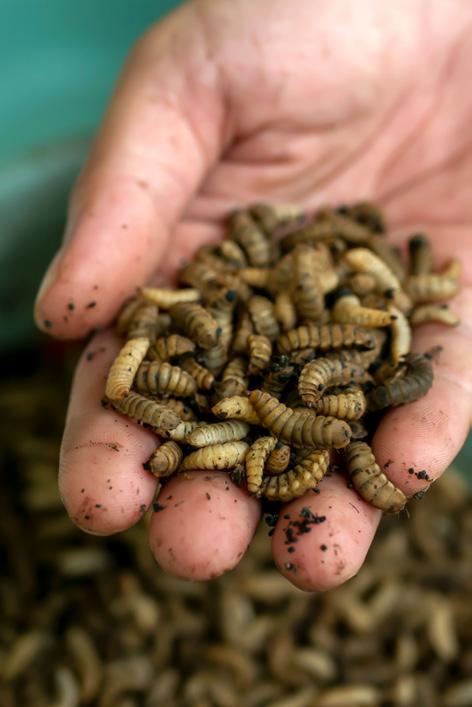
4,000
This will ensure that approximately 4,000 mega tonnes of lactose are repurposed as feed material instead of biogas production.
Plant-based cheese with easy-to-implement technology
Challenge
As consumer preferences shift and awareness of the environmental impacts of animal production grows, the need for plant-based alternatives to animal products is increasing rapidly.
However, replicating the richness and complexity of dairybased cheeses remains a challenge. Traditional cheese production does typically not have the technology to produce plant-based cheese. If produced, plant-based cheeses often contain the ingredient coconut oil which not only negatively affect flavour, but has severe sustainability issues.
Solution
FÆRM has developed an easy and affordable technology that allows cheese manufactures to offer customers a plant-based cheese alternative. The process applies established dairy science principles to plant-based ingredients, resulting in cheese alternatives with authentic taste and texture. The unique approach allows for a production that uses already existing facilities, enabling cheese producers to offer high-quality, non-dairy alternatives to customers with minimal disruption in production.
By using enzymes combined with a preferred protein, water, and sunflower oil, FÆRM’s technology allows for the production of products such as cream cheese and mozzarella. All with the qualities, structure and flavour experienced in dairy-based chesses, just made with beans instead.
Result
FÆRM incorporate fermentation techniques in their technology which is amongst first of its kind. It is a costeffective and easy-to-implement suited for established cheese production.
The versatility of the technology means it can be adapted to fit different equipment, needs and market group. By making the technology easy and affordable to implement regardless of size and facilities of companies, FÆRM is ensuring easy access to plant-based alternatives for all.

The unique approach allows for a production that uses already existing facilities, enabling cheese producers to offer high-quality, non-dairy alternatives to customers with minimal disruption in production.
SOLUTION PROVIDER EVODIABIO
LOCATION RØDOVRE
Creating natural flavours by mirroring nature itself
Challenge
Aromas are essential to food production, as they play a key role in creating taste. Traditionally, these aromas are either produced synthetically using chemical solvents or through compounds extracted directly from cultivated plants. Both requiring substantial resources.
For example, producing one kilo of lavender aroma requires approximately 200 kilos of plant material. These traditional processes can deplete natural resources and leave a significant carbon footprint.
Solution
EvodiaBio has developed a new method to create aromas by mimicking and scaling processes already occurring within plants. Their fermentation-based approach uses yeast strains to convert simple sugars into monoterpenes-microscopic molecules that engage the senses through the nose, mouth and throat.
Although invisible to the eye, monoterpenes are crucial for the flavours of the foods we consume. For the first time, this process enables the industrial-scale production of these volatile molecules.
Result
EvodiaBio’s first product targets non-alcoholic beer, a category where replicating authentic flavours has been a long-standing challenge.
The yeast-based fermentation process produces pure, natural aromas that replicate hop flavours, usually only found in alcoholic beer. The process uses only one litre of water, compared to the nearly 3,000 litres required to grow one kilo of aroma hops through traditional farming. This innovation reduces the carbon footprint of aroma production by over 80 percent.
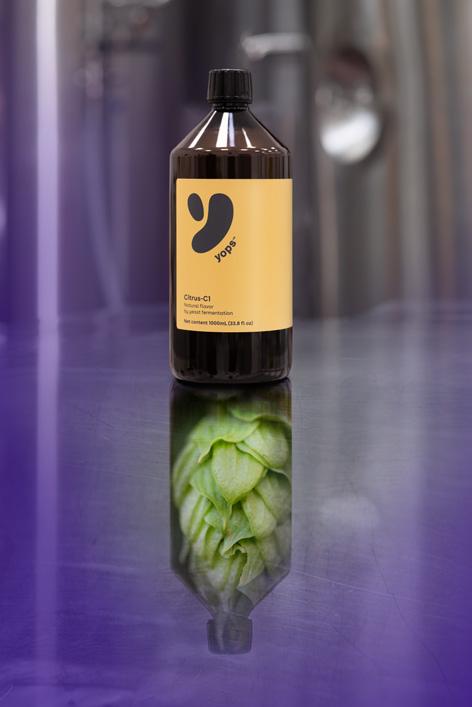
This innovation reduces the carbon footprint of aroma production by over 80 percent. >80%
SOLUTION PROVIDER CHROMOLOGICS
LOCATION SØBORG
Natural colours crafted by fermentation
Challenge
Traditional colourings used in textiles, food, and clothing are often chemically synthesised, posing potential environmental and health risks.
This approach bypasses the need for raw material extraction, providing a more efficient and sustainable alternative.
Result
Compared to traditional colouring methods, precision fermentation offers a far more sustainable solution. It requires ten times less agricultural land and significantly reduces crop input. Additionally, production is independent of external factors like adverse weather conditions, ensuring greater resilience amid climate change. TYPE FOOD
Natural colouring extracted from sources like tomatoes, potatoes, beetroot or insects are safer but have their limitations. The production depends heavily on seasonal availability, requires substantial agricultural land and competes with food crops for resources – contributing to farmland depletion and food scarcity. Moreover, their performance is often inferior to synthetic colours.
Solution
The Danish biotech company Chromologics addresses these challenges by employing precision fermentation to transform sugars into colours. Following fermentation, residual fungi are filtered out, and the fermentation liquid is processed into a concentrated red powder.
This powder forms the base for Chromologics’ two products:
• Natu.Red® designed as a natural food colouring
• Sustainly.Red® tailored for applications beyond the food industry

The solution requires ten times less agricultural land and significantly reduces crop input. 10X

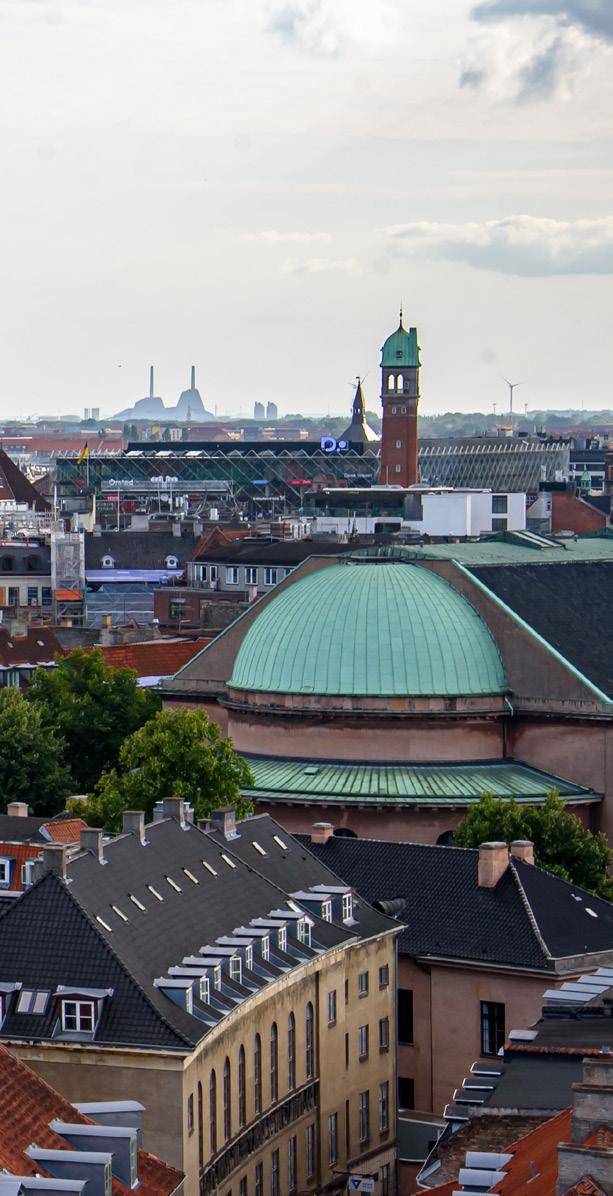
Discover more and connect with solution providers
Biosolutions will play an important role in the green transition and in the transition from a fossil-fuel-based economy to a bio-based one. The industry is in rapid development, with new solutions continuing to develop every day. With continued investments and research, the potential of biosolutions can be fulfilled. But to succeed, global collaboration is required.
The Danish biosolutions industry is ready to connect with future partners. State of Green is the place to discover and connect.
About State of Green
State of Green is a not-for-profit, public-private partnership between the Danish government and the country’s three leading business organisations (Danish Industry, Green Power Denmark, and the Danish Agriculture and Food Council).
State of Green is your one-stop-shop to more than 600 Danish businesses, agencies, academic institutions, experts and researchers. State of Green connects you with leading Danish players working to drive the global transition to a sustainable, low-carbon, resource-efficient society.
Learn more about biosolutions, find cases and projects, and connect with Danish expertise at stateofgreen.com.
